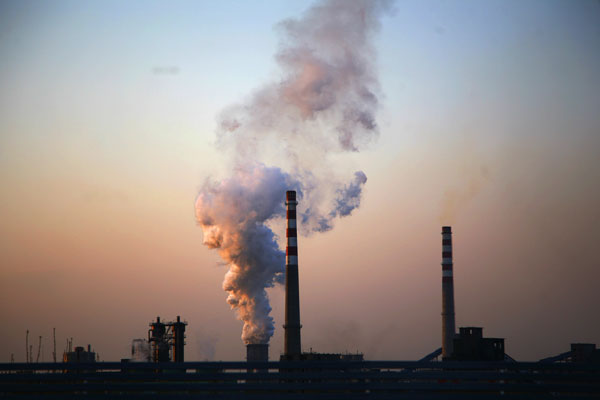Finance called key to Paris climate talks
 0 Comment(s)
0 Comment(s) Print
Print E-mail China Daily, November 1, 2015
E-mail China Daily, November 1, 2015
|
|
|
Smoke billows from a factory in Dezhou, Shandong province. [Provided to China Daily] |
Climate change ministers from Brazil, South Africa, India and China, also known as the BASIC countries, said finance will be a decisive factor in the milestone Paris climate summit beginning in late November.
As emerging developing countries, the four share common grounds on crucial issues. The two-day meeting in Beijing was the 21st BASIC ministerial meeting on climate change since 2009.
Developed countries should define a clear road map and pathway toward achieving their goal of providing $100 billion per year by 2020, said Xie Zhenhua, special representative for climate change of China.
In addition, "developed countries should substantially scale up their support in the post-2020 period, with $100 billion per year as a starting point," said Xie.
Developing countries need the financial resources, technology development and transfer and capacity-building support from developed countries to help them cut greenhouse gas emissions and reduce likely damage from climate change.
Ministers expressed their "unequivocal commitment" toward a successful outcome in Paris and committed to work together with other parties to reach an "equitable, ambitious, comprehensive, balanced and durable" Paris agreement.
Izabella Teixeira, minister for the environment of Brazil, said the BASIC countries are committed to addressing climate change and sustainable development and want an agreement based on solutions.
The Paris agreement shall be in full accordance with the principles of equity and common but differentiated responsibilities and respective capabilities, ministers said.
Also, differentiation between developed and developing countries should be reflected in each element of the agreement, according to a joint statement issued at the conclusion of the meeting.
Contributions should be nationally determined and comprehensive, covering mitigation, adaptation and provision of support by developed countries to developing countries, said ministers.
Despite the multiple social and economic challenges facing BASIC countries, the are undertaking robust actions domestically on climate change, said Xie.
For instance, China pledges to cut carbon dioxide emissions per unit of gross domestic product by 60 to 65 percent from the 2005 level by 2030, and peak its emissions by around 2030.
Developed countries should revisit and increase their emission reduction commitments under the convention or the second commitment period of the Kyoto Protocol, said the statement.
"Developing countries have pledged more than their fair share, and developed countries pledged less than their fair share," said Prakash Javadekar, minister of state of Environment, Forests and Climate Change of India.
More than 150 countries are coming forward with national commitments, known as Intended Nationally Determined Contributions, or INDCs.
Jennifer Morgan, global director of the climate program with the World Resources Institute said that with more than 153 countries coming forward with national commitments, there is now an unprecedented level of cooperation on climate change.
"The Paris agreement has not yet been sealed, but is already raising our sights about what's possible," she said.
A UN report issued on Oct 30 finds that current commitments are not yet sufficient to meet what the world needs.
"Countries must accelerate their efforts after the Paris summit in order to stave off climate change," she said.







Go to Forum >>0 Comment(s)